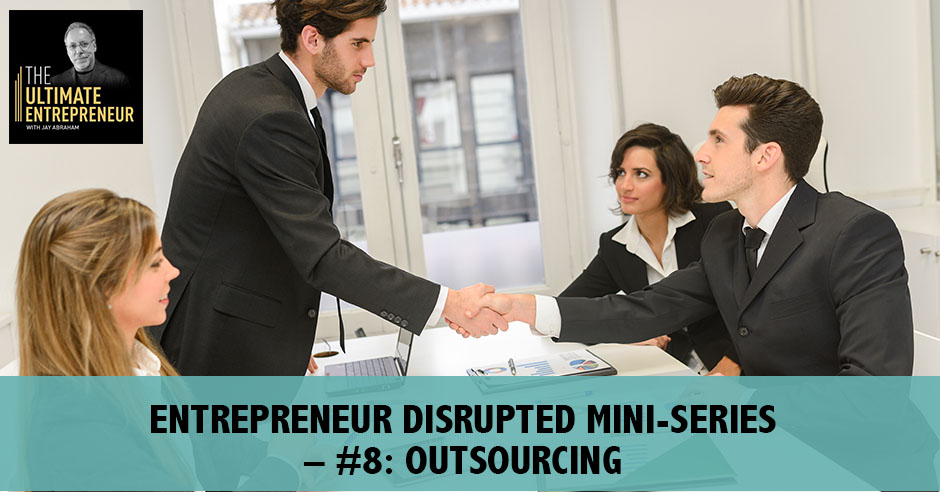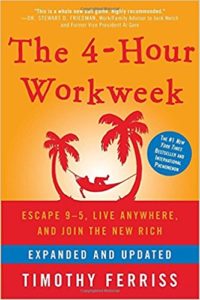Entrepreneur Disrupted Mini-Series – #8: Outsourcing


Outsourcing is easier today than ever before in history – but is it always the right move to make? Jay Abraham and Dave Asprey go deep into the question many entrepreneurs are asking themselves today: Do we outsource it, or do we do it ourselves? They discuss both the advantages as well as the challenges that come with outsourcing – and how convenient and easy doesn’t always mean the right fit. Learn how to avoid incompetency and ensuring that whoever you outsource to is congruent with the message you and your business represent. #8 of Entrepreneur Disrupted is about how to disrupt your business, your industry and probably your mind in the process of outsourcing as a kick-ass entrepreneur.
Listen to the podcast here:
Entrepreneur Disrupted Mini-Series – #8: Outsourcing
This episode has Dave and I discussing a major topic that has become more relevant to businesses today than at any other time in history, and that is outsourcing. With a wild impact that technology has made on the world environment of business, outsourcing has never been easier. Many business owners and entrepreneurs constantly find themselves asking the question, “Do we outsource it or do we build it ourselves?” Why figure out how to do something yourself and struggle with both the expense, logistics, learning curve, when there’s already hundreds of qualified providers worldwide eagerly willing to do it for you.
That’s the issue Dave and I are going to tackle for you in this episode. We talk about both the advantages as well as the challenges that come with outsourcing and how convenient and easy don’t always mean it’s the right fit for your business. We discuss avoiding incompetency and ensuring that whoever you outsource to is congruent with the message and positioning you and your business represent to the marketplace. Dave and I share our very own personal outsourcing horror stories and teach you the crucial lessons that resulted from them, so you won’t have to relive them and the costly and frustrating mistakes for yourself. I hope you pay close attention, learn a lot, and enjoy the adventure with us.
We’re here to solve a big problem for entrepreneur. There’s a question for everything your company does, and it’s, “Do you outsource it or do you not outsource it?” What I would say is maybe not the current cool thing here, but I’ll tell you how I’ve grown Bulletproof rapidly. Let’s start with your perspective on this one.
Why don’t you start because you have a context that’s going to be very interesting and transcendent? You’ve seen technology grow. You’ve seen services that make various goals much easier. You’ve seen the cloud. If you basically start, it will be a better context and I’ll build on it, affirm it or challenge it.

The 4-Hour Workweek: Escape 9-5, Live Anywhere, and Join the New Rich
There are a variety of people they’ll tell you, “Just outsource everything. It’s easier than ever. When you do this, you can have that blissful, “I only work a couple hours a week. I live on an island and everything’s good.” That’s not my experience. When I first read The 4-Hour Workweek, when it was very first published, I was like, “This is the coolest thing ever.” I worked for a $10 million or $15 million a year Cambridge, UK-based tech company called Zeus Technologies. We had a superior product and we had absolutely crappy British marketing because, especially going back at that time, it was more important to be polite than it was to market well.
I was not the polite kind of guy so that wasn’t the best fit for me whatsoever, but I said, “Tim Ferriss has inspired me, so I’m going to hire my own executive assistant.”I hired one from the Philippines for $800 a month and she worked full time for me. She was up when I was up. She was always available on Skype or Yahoo Messenger. It caused horrible consternation at the company. We only had 50 or 60 employees on both sides of the pond. You can’t give her access to your email. I’m like, “I’m not going to have access to my email if she’s not going to have access to my email, so we have a problem here.”I’m one of our executives on the executive team and like, “You want to pay for it? I don’t really care. I have an outsourced person who’s a lot cheaper than an admin and I don’t have my own EA in the budget, so what do you want to do here?”
They acquiesced, and I had this. The problem was it took so long to train her and tell her what to do that I realized I was spending more time managing this kind of outsourced person than it was worth. It also caused problems on the other end because I didn’t control the employment relationship. My deal was, “If I have nothing for you to do, watch a movie. I don’t care. I just want you sitting there for when I need you.”Everyone else in her office of 50 people had horrible drudgery jobs. I kept her busy with high demands. Other times, she’d watch a movie, and then she’d get yelled at by all the other virtual assistants saying, “It’s not fair. She’s watching a movie on the job.” I’m like, “I told her to watch a movie on the job. Shut up.” If she was my employee, I could have just set that standard which is, “Be there and get it done,” and the rest of the time like, “It’s totally cool.” That’s the whole point. You can live any lifestyle you want, it’s not my business. Get your stuff done. I couldn’t translate that culture into her and it didn’t work. Maybe she was the wrong hire but that taught me a lot. It looks good on paper. If you have this very specific project that’s very well-defined, outsource that. At Bulletproof there are lots of things that I could give out to some agency and I have a PR agency. We have a branding agency. Those things are normally outsourced because you don’t need a full-time branding agency working for you because you don’t rebrand or evolve the brand aggressively most of the time, so these make sense.
I hire a lot of people whereas a lot of my contemporary entrepreneurs, even at the level that I play, they’re like, “I’ve got to have less people.” Brendon Burchard, who’s a good friend, has so few people working for him. Bill Harris, who’s another good friend who runs Centerpointe, one of the brain hacking companies, he’s sold millions and millions of dollars of these technologies and he’s actively working to have more contractors and less employees. I’m doing the opposite. I have 30 open requisitions and my employees get stock options. They get benefits. I fundamentally believe that the training time and the transaction management time for hiring people outside the company is not worth it for a lot of the time. I’m so lazy that I’d rather pay someone more to know the people, the players, and the field and to be in the company and to be part of the mission than I would to be able to reach out to someone who honestly doesn’t give a shit about my success because it’s very transactional, and may or may not try and steal our intellectual property. It’s just not worth the inconvenience.
I’m building a team of people who know why we do what we do. They know the mission. They’re loyal to the mission and to the cause. They know they’re helping millions of people. You don’t get that when you push a button on oDesk and a random person does a random task. You don’t get that off Fiverr, and I’m not willing to deal with a second quality stuff or things that where me or my team has to spend a lot of time managing quality because we’re skimming the bottom of the barrel in terms of what we’re willing to pay. I’ll pay a little bit more, I’ll make you part of the team, I’ll make you part of the success, and I believe very strongly that for our culture, bringing people in and making them part of the success breeds loyalty, behavior, decision making, and focus that no entrepreneur will get by going to Fourerr instead of Fiverr because you saved a buck. This is like the dark side of on-demand economy. People get paid less, but also people just don’t care. People will steal from you. They’ll take your ideas and they’ll take your relationships. I get enough copy cats already doing inferior stuff. The last thing I want to do is have one of them work for me for twenty minutes, pay them $6, and then take whatever they learn and go do it for someone else.
I believe when it’s reasonable and possible and you can afford the ongoing cashflow situation, that there’s a really good argument for having people on as contractors at first because you’re not sure you want to bring him in. When you know they’re good, give them some perks, give them him some equity, give them a profit share or whatever your incentive plan is. Bring them in and make them a part of the team. Team behaviors in company culture like that, I don’t think you can put a value on it, but it’s millions of dollars.
First of all, any company that is trying to connect with their market in a big way and uses voicemail is stupid. Having someone represent the company when you call in is a very human thing. We had somebody doing our LinkedIn and somebody doing something else and they left. We don’t know our codes, and we can’t find a human being at LinkedIn and we can’t find a human being. They say, “You can’t do it,” even though we prove it’s me. Nobody will call you, and it defeats the whole stature and whatever your attitudinal admiration, it basically vaporize. That’s just a comment. If you’re trying to represent that you are important to me, even if it’s a pass through, if you got enough profit, there’s a lot of strategic distinctions that are nuanced. They’re all the difference between the execution. Almost anything is critical that you entrust to anybody that’s an extension of what you’re trying to be, do and be seen as. My son worked for a company that managed the monetization for artists. They had a 2Pac’s estate, they had The Doors’ estate, and there are a lot of them. A lot of people think these people are making all this money from records. Their estates make it from selling t-shirts and selling tchotchkes, which is Jewish for things. At Christmas time, they had this big surge, but they moved suppliers. The supplier didn’t do what they were going to. They under fulfilled for these groups or their estates millions of dollars. The business blew up and somebody made a decision to go to a lesser provider. That’s one thing.

Entrepreneur Disrupted: Enterprise is living, breathing and growing.
Second is when I used to use outside providers prior to the days of the internet, I would assign an auditor. For example, you talk about direct response. I used to mail 10 million pieces a quarter. It was very easy because it was bulk mail. Bulk mail is weighed, it’s not counted, it’s very sloppy. An unscrupulous or a cash flow impaired mailing service can leave a couple thousand out of every twenty and you wouldn’t know it. I would have auditors that would count, and they would look at the stamps. They would bribe on the trucks to make sure it got delivered because the differential of an extra 50,000 might be breakeven profit. I’m very big on this crusade mission, driving passion, purpose, a sense of achievement, mental possibility. It’s not possible unless you’re some way connected on a continuous basis to the enterprise, because enterprise is living, breathing and growing. It’s like a person. I used to sell radio advertising, one of my very early first jobs, and it was very interesting. We had a sales manager that had a mandate. We would have a meeting at 8:00 AM and a meeting at 5:00 PM every day. The meeting was not about who you’re going to sell as much as what’s going on in the station. The meeting was about listening to what happened on the station and him asking questions at the end of the day of anybody who was in their car driving, and his belief was, “If you couldn’t talk about your stage and if you weren’t really in love with your station, if you didn’t personify, animate, exemplify that station, how could you be expected to get someone else excited about it?”
David Ogilvy would never do anything but use his own company’s products and services. Not from a loyalty, but because he wouldn’t represent somebody unless he believed they were the absolute premiere. Maybe not the premier in high-end, but for whatever the value proposition was. I believe very ardently that the key to preeminent, and preeminent is a deeper subject because it doesn’t have to be the most expensive but it’s seen as the only viable solution, is the congruity you create by not just having a team, and not just having a crusade, but having this living, breathing entity that’s like your children, that you’re building character. Whether product or services outsourced, their business model out of economic growth for them and survival is high diversification. High diversification and growth brings incompetency because they may or may not be listening to these podcasts. What I’m very mindful of because I’ve seen so many unimaginable ways to hurt, poison, or compromise all that a business has created in the mind’s eye of their market by one stupid, foolish, non-presence of mind action that a third party who doesn’t have any clue. If I were going to outsource, I would bring everybody in; I would have them experience it; I would take them on sales visits; I would have them see what we do; I would get them so deeply inculcated in what we’re all about because anything less than that is a long-term toxic business, constraining, suffocating, and devaluing act.
Almost everyone in the industries that I play now outsources manufacturing, and I do that too. For people who aren’t familiar with Bulletproof, I make a line of coffee that has a different process for making the green coffee. It is free of things that are in coffee that make you cranky. These are neurotoxins formed by mold. I made this stuff because I feel a difference myself. When I drink most coffee, even like good coffee, $20-pound coffee, quite often I get a headache, jittery, cranky, and I want to yell at my kids. I’m a good barometer for this stuff. We put in really extensive lab testing, like first identifying how to make coffee that didn’t have these toxins in it.
The problem is I’m dealing with a string of outsourcers and some of them are guys picking coffee. I’ve met the guys picking coffee and picked coffee with them for a day. I don’t really speak their language, which is Spanish. There are probably fourteen or fifteen different places where someone could screw something up with a variety of outsourcers and from transportation. The only way I can verify that they did what they said they were going to do well enough is with lab testing. After I get the coffee from the Bulletproof process where we put in our own infrastructure, but we’ve outsources operating it, “Did they do it right?”The truth is in the lab data. That’s an example where outsourcing might make sense because I can at least stop it. I bought a bulk powder. There are a lot of people buying something called MCT powder. Most of it comes from China. It’s sprayed on genetically modified stuff that raises insulin, and the oil itself was made on machines that are not even food-grade machines and has impurities that cause what I call a disaster. If you’re buying in bulk, you’re effectively outsourcing whether you know it or not. Most people don’t have the rationale. It’s like, “I don’t know. I bought some stuff and I poured it into this and I did that.” Whereas what I’m doing is I’m taking something that’s not MCT oil. It’s a subset of MCT oil that’s made with an exclusive agreement by one of our outsourcing partners exactly to our standards, and then we our spray drying it ourselves. Still an outsourcer does the spray drying because I didn’t want to spend $10 million that I don’t have on a spray drying thing that I would use approximately 5% of the time. You have to outsource that kind of stuff.
Another product that I was about to launch, I found out that one of my manufacturing partners didn’t buy food-grade containers. They manufactured this stuff for us. They put it in containers that were not marked food-grade and they didn’t sterilize the containers first. They claimed they sterilized them with lukewarm water, no chemicals and no ozone gas. I’m like, “What?” They didn’t tell me they didn’t do this. The next part of the manufacturing process here that was outsourced, they said, “Our contract said you can sit on the ingredient no more than five days before you process it to the next step.” The reason is for biological controls. We find out when we’re doing our audit, it looks like they sign it up for up to 30 days and didn’t tell us. You trust people to do what they said. You have a contract that says, “I’ll do what they said.” They don’t do it because they don’t care. Maybe they’re just incompetent but incompetence comes from not caring. It’s wondering if you care. You worked really hard and you knew it didn’t happen. You communicated it, I’m fine with that. How do we find out? We found out because I do more lab testing on it. That’s easy because I know what to test for and because it’s quantitative. If you’re doing this with something like a metric like customer satisfaction, it’s much harder to get lab data on customer satisfaction. You can get raw data on your call center and dwell time, but whether the person left with a good vibe after talking with your outsourced customer service agent is going to take you months and months and you’re never really going to know.
The customer service people at Bulletproof, you know how many of those are outsourced? None of them. Ben, who runs that team, is diehard Bulletproof guy. He’s been with us for almost four years and he’s a musician. How do I know this? Because he’s part of the team. Did Bulletproof change his life? Yes. Is he completely on mission? Yes. Does he care so much about every customer? Yes. You cannot get that from an outsourcer. It will not happen ever. That’s why if you can outsource it, you can quantify it, you can keep them honest. Doing that doesn’t cost you millions of dollars or take you out of your game because you’re spending so much time worrying about whether you can trust your outsourcers, that’s when I think it makes sense. We talked about outsourcing hard stuff like manufacturing. We talked about outsourcing soft stuff, the areas where outsourcing makes the most sense to me, PR. I’ve had a public relations person in-house working for me when I was VP of marketing. Most of the bigger companies have one or two PR people, but even then, we have an agency. If you’re an entrepreneur who’s never worked with a good PR agency, you probably won’t know the difference between a good and bad. There are a lot of bad ones out there. If you’re dealing with a client who hasn’t tasted what a good one does, you won’t know.

Entrepreneur Disrupted: Bulletproof is about human performance. Entrepreneur Disrupted is about how to disrupt your business.
The level of preparation and the level of background conversations and relationships that happened to get you an appearance on a major show, and I’ve been on countless big things to CNN and ABC Nightline. About two or three of those are organic because I’ve worked with PR. I have been a reporter for a tech magazine many years ago, and so I know that game really well. I’ve organically gotten a few, especially early on, that were helpful. The vast majority of those things come because you know how to tell your story and you have a peer agency that was really good. They’re only really good at that because you can’t have that in-house, because they have relationships with all of the publications and they know who to call for what store in what angle. If I have the best PR person on earth working for me, they’re going to have to have an agency because the agencies have a bigger reach. That’s a perfect soft skill.
Will I know whether they’re successful? Yes, because I have a huge spreadsheet that comes in every couple of weeks. It says, “Here’s what we did. Here’s what we’re doing. Here’s the hit rate.”The one big miss that I’ve seen so far is when the Bulletproof diet came out. I was on the Fox News, Fox Health, but I wasn’t on Dr. Oz or The Doctors, which I would consider a PR miss. I know exactly what’s going on there and that’ll probably happen at some point or another, but I do track things like that. Whether that was in-house or out of house, I can see that. Call centers are so oftentimes outsourced. Maybe some parts of it could be but for me, we are hiring. We have open recs right now for people in our own, like customer service reps who answer the phone who work for Bulletproof. They have stock options and they have a whole bunch of other perks. I want to talk about perks and employment incenting. This would be really helpful. We’ll do that in the next episode or maybe a subsequent episode. That’s probably the next thing Jay and I are going to talk about.
This Entrepreneur Disrupted, that is not about Bulletproof. Bulletproof is about human performance. Entrepreneur Disrupted is about how to disrupt your business, your industry and probably your mind in the process of being a kick-ass entrepreneur.
Important Links:

